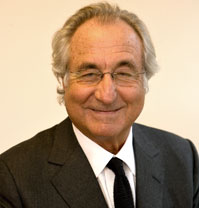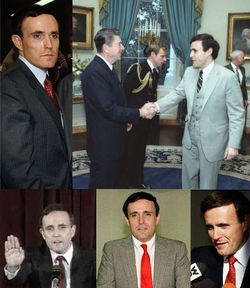The purpose of regulation is to crime prevention.
Businesses have spent the last generation either ignoring or pretending to ignore this.
Businesses must, by their very nature, skate close to the edge of the law. Those who skate closest without crossing over have a big advantage.
So regulation exists to prevent this competition from sending ordinary businessmen to jail. It is filled with civil penalties which say, "whoa," and whose effect is to level the playing field between those who are skating close to the edge and those trying to stay well away from it.
It's an important lesson we need to become clear about as we enter a new era. How do we best teach the lesson?
It's a two step process. Part of it is putting those who erased the line and broke the law in jail for life. What is left of Bernard Madoff's (above) life is likely to be brief. But the lesson of his crime and punishment is all we have to guarantee that some young punk doesn't decide, "just don't get caught." We need to "send a message" about suite crime.
Of course, that's only step one. Step two is creating new regulations and structures to enforce this law. You can't just trust a company with the word "trust" in its name. This must be verified, through reports and audits, through giving government the right to come down hard on things that seem trifling.
Regulators are cops on the market beat. We can argue about how they're doing their job, about whether they are doing it efficiently, about whether they can do it more efficiently. But we should never, ever again, argue about the need for cops on the corporate streets, any more than we argue about the need for real cops on real streets.
It's ironic. The need for proper business regulation was actually made two decades ago. By Rudy Giuliani. He called it the "broken windows" theory.
The idea was first developed in a 1982 Atlantic article by George Kelling and James Q. Wilson.
Giuliani's successful test of this theory, through Police Chief William Bratton, made his political career, and it turned Wilson into a conservative political hero. Kelling, too, moved into a right-wing think tank, apparently never thinking that the lessons of "broken windows" might apply equally to Wall Street businessmen as to street punks.
The windows in this case are metaphors for shady dealings of all types. But the thesis is even more important here than it is uptown. Businesses have greater responsibilities than ordinary citizens. They have more power. We depend on them to build our entire economy. They earn enormous rewards from this.
So why do they need police less? They need them more.
All kinds of regulations are covered by the "broken windows" rule. Not just accounting regulations and securities regulations, but environmental regulations, safety regulations, the whole lot. When a business violates a regulation it pays a fine, but it does not violate the law — its CEO and directors are not hauled away in handcuffs and given new friends who call them "meat."
Yet violations of regulations can, in fact, lead to death. Ignore safety regulations in a mine or a meat packing plant and workers lose their lives. Access to the civil courts is no redress — the limb or the life is already lost.
The same is true in the Madoff case. None of his fraud's victims will ever get their money back — those great foundations and fortunes are gone. And the unwillingness of politicians to properly regulate business, as well as the SEC's unwillingness to enforce those regulations on the books, are as much to blame for what has happened here as Madoff himself.
Any reporter who continues to ignore the validity of "broken windows" in business (I'm looking at you, Dennis Keneale ) needs to leave the profession. Any politician who advocates de-regulation (I'm looking at you, Larry Kudlow) needs to be driven from the public square, for being objectively pro-crime.
Anyone who argues for de-regulation, from this point forward, is soft on crime. They're coddling criminals. They're enabling the next Madoff, ignoring the lessons of Enron, and we should ask whether they're in the pay of crime bosses.
If you're a businessman who likes to ignore regulation, or who thinks orderly regulation is not necessary to the organization of a free market, then that's what you are, a crime boss. You should be named and shamed as such.
That's all for the future. For now learn the lesson. Broken windows on Wall Street and Main Street are as deadly as they are on 125th Street. And business cops are as important as those patrolling your own street.
For the same reason.













Funny typo, “The purpose of regulation is to crime prevention.”
I thinking criming regulation is exactly the problem we’re facing.
Funny typo, “The purpose of regulation is to crime prevention.”
I thinking criming regulation is exactly the problem we’re facing.